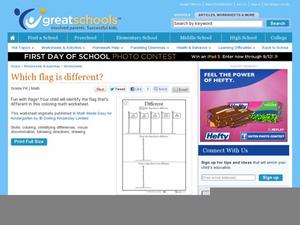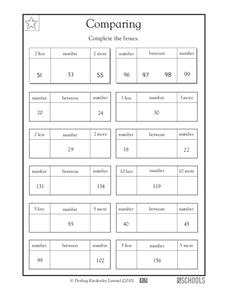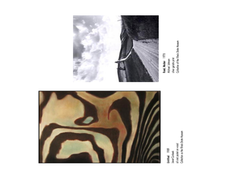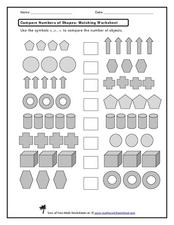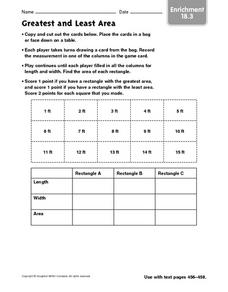Curated OER
Decimal Problems
In this decimals worksheet, students solve 18 different types of problems that include both decimals and non-decimals. First, they subtract the measurement problems given both in metric units and in US units. Then, students subtract the...
Curated OER
Tell It to the Judge - Persuasive Essay
Learners write a persuasive essay that compares and contrasts a classic fairy tales with a fractured one. They use the writing process to complete and publish the essay.
Curated OER
Indiana Applied Skills Assessment Sample
In this Applied Skills Assessment worksheet, 5th graders complete a sample state assessment for Language Arts and Mathematics for 5th graders. They read a writing prompt and complete a writing activity that follows, answer various types...
Dorling Kindersley
Which flag is different?
Little ones build visual discrimination skills and fine motor control, while identifying differences. They circle the flag that is different, then they draw a flag that looks different than the others and the same as the others shown....
Houghton Mifflin Harcourt
Fraction Strips
Identify, compare, and order fractions with a hands-on learning tool. Fraction strips are a great way to help young mathematicians understand and visualize fraction values. The worksheet can be made into an activity in which pupils cut...
Curated OER
Comparing-Contrasting With Cookies
Students compare and contrast cookies. In this compare and contrast lesson, students complete a graphic organizer and identify the similarities and differences in Girl Scout Cookies. Students write an analysis.
Curated OER
Clown or Comedian
Pupils discover how to compare and contrast the differences between a clown and a comedian. They use dictionaries to expand their vocabulary.
Curated OER
My Community: Then and Now
Young scholars compare and contrast their community to what it was like 50 years ago. They research various aspects of their community and compare and contrast with what it is like now. Students present and discuss their findings.
Curated OER
Comparing
Examine short number sequences to help scholars explore value comparisons. They look at various given numbers (both two-digit and three-digit) and write in values that are less or more by specific one-digit numbers (i.e. three less, two...
Curated OER
The Houdini Box: Compare and Contrast
How did Houdini do it? After reading a short passage about magicians and their tricks, readers are asked to compare and contrast some of the illusions these prestidigitators create.
Curated OER
Solving Inequalities
Middle schoolers solve 10 different problems that include multiplication and division of various inequalities. They determine how to make each inequality true. Pupils multiply or divide both sides of an inequality by any positive number...
Curated OER
Compare and Contrast Art
Practice the skill of compare and contrast. First, show learners the different pairs of artwork in the project packet (included). Then, each learner chooses one of the pairs and finds the similarities and differences between the...
Curated OER
Compare Numbers of Shapes
As they examine sets of shapes, learners compare the number of objects in each pair. There are eight comparisons total, and scholars use the symbols .
Math Worksheets Land
Compare Two-Digit Numbers - Guided Lesson
Practice comparing number values in a variety of activities on this worksheet. Youngsters complete a statement comparing 20 to 20, choosing from three options: is greater than, is less than, and is equal to. Then, they put four numbers...
Curated OER
Ordering Rational Numbers and Finding Their Approximate
Middle schoolers explore the concept of ordering rational numbers on a number line. They represent rational numbers as decimals and percents. Pupils create a foldable about converting fractions to decimals to percents, and use a...
Curated OER
Order Numbers On a Number Line
Fifth and sixth graders study the use of a number line to add integers and they observe a teacher demonstration of how to add integers on a number line. Afterward, they construct a number line and use the number line to solve addition...
Curated OER
Relating Fractions and Decimals
Sixth graders identify how fractions and decimals both illustrate parts of a whole. They estimate which number is greater by comparing them to the given fraction and use greater than or less than symbols for each.
Curated OER
Trick-or-Treat
Who has the most candy? Kids often have candy on the brain, so get them to learn in the process! Here is a great counting worksheet for Halloween week. Learners compare candy stashes between four pairs of kids. They count each stash,...
Curated OER
Study Guide: Rational Numbers
In this rational numbers worksheet, students solve and complete 8 different problems that include applying the comparison property and density property for rational numbers. First, they replace each blank with the correct symbol to make...
Curated OER
Reading, Writing, and Ordering Numbers
Students study place value. Students participate in place value and number relay games, write numbers in words, and discuss how numbers are read. As a class, they discuss the meaning of less than and grater than signs. Students use...
Curated OER
Fraction and Decimal Ordering
Ordering numbers just got physical! Learners practice putting numbers in sequence, both in fraction and decimal form. To begin, they line up in birthday order and discuss the difference between ascending and descending. They are then...
Curated OER
Choose a Graph to Display Data
In this math graphs worksheet, students write line plot, tally chart, pictograph, or bar graph to tell the best kind of graph to use to answer the six questions.
Curated OER
Greatest and Least Area - Enrichment 18.3
In this greatest and least area game worksheet, students cut out the cards, draw a card and record the measurement in the length or width column of a graph. When all columns have been filled, they calculate the areas to find the winner...
Curated OER
Shopping the Sunday Circular
Pupils demonstrate an understanding of price-per-unit mathematics. In this computation lesson, learners accurately figure the unit price of grocery items. They create a chart and record the item, the price, the size and the cost per item.





